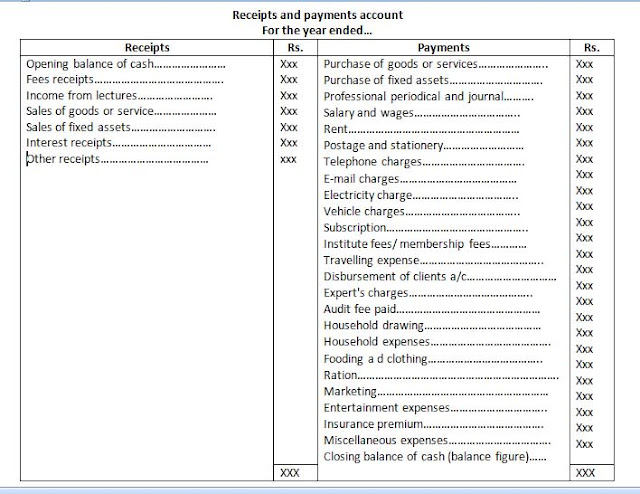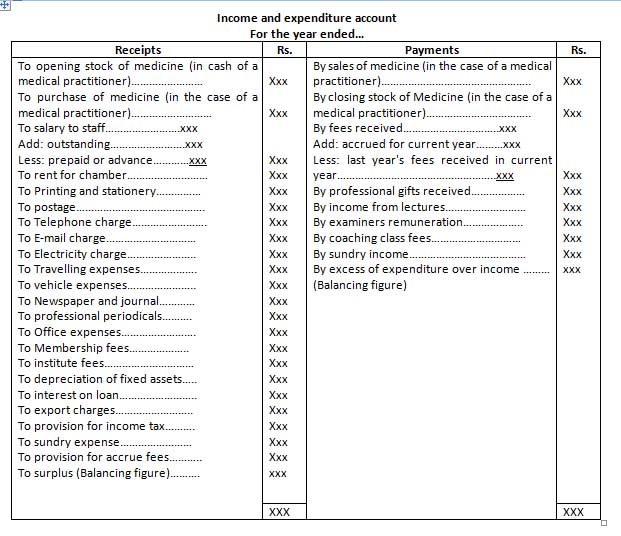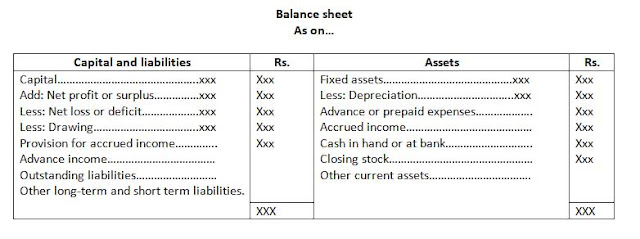Accounting for
Professional person
Concept
Any type of job that needs
special training or a particular skill, such as being a doctor or lawyer or
character accountant, but not work in business or industry is called
"profession". But it is something a little more than a job. Actually,
it is a vocation founded upon specialized high.
Similarly, a person who is
competent or skilled in a particular activity as well as formally certified by
a professional body of belong we to a specific profession, is called
'professional person."
The professional person i.e.
doctors, engineers, lawyers, chartered account IT professional, etc. are
engaged in income generation activities, therefore, they have to maintain their
books of account properly adopting double entry systems. On the basis of their
books of account, surplus from their professional income can be determined for
income tax purpose, because professional persons should pay income tax on their
net income. Accounting for professional person is needed for income tax
purposes.
Techniques in General Account for profession
The professional services
field is a broad one. It includes doctors, lawyers, architects, engineers and
consultants. Their services have some unique challenges with multiple clients
and various different ways of billing keeping track of income and expense can
be hard.
Accounts of a profession are
prepared using cash basis of account not the accrual basis of accounting; cash
basis of accounting does not recognize income receivable because it is
uncertain. It does not treat receivable as income. Generally, financial
statements of a profession is prepared to ascertain surplus or deficiency
(profit or loss), and closing balance of cash. Accounts of a profession
include:
Receipts and payments account
Receipt and payments account
is the summary of cash receipts and cash payments of a profession for a certain
period. It is prepared at the end of accounting period. All cash receipts are recorded
on the debit side and all cash payments are recorded are recorded on the credit
side of this account. Therefore receipt and payment account is kind of cash
book on which credit and outstanding transactions are not and payment account
is a kind of cash book on which credit and outstanding transactions are not
recorded.
The following are the main
feature of receipt and payment account:
- It is a real account.
- It starts with opening balance of cash and bank on its debit side.
- It is just like a cash book.
- All cash receipts are shown on its debit side.
- All cash payments are shown on its credit side.
- It includes all capital and revenue cash receipts and cash payments.
- It includes all cash receipts and cash payments last year and next year in additions to currents year.
- It does not included outstanding expenses and accrued incomes.
- It does not include on cash expenses such as depreciation, provision for bad debts, etc.
- The balancing figure of this account on credit side is called closing balance of cash.
The following format is used
to prepare this account:
Income and expenditure account
Income and expenditure
account of profession is prepared in place of profit and loss account to known
the position of surplus or deficit. This account shows all revenue income and
losses on its debit side. Similarly, all revenue expenditures and gains are shown
on its credit side. If the total of credit side is ore, the balancing figure on
debit side is called surplus or excess of income over expenditure. It's just
opposite, if the total of debit side is more than its credit side, the
balancing figure on credit side is called deficit or excess of expenditure over
income. This account does not include capital income and expenditures.
Outstanding expenses of the current year are added to concerned expenses and
are shown on debit of this account; similarly, accrued incomes of this year are
added to concerned incomes and are shown on credit of this account. This account
showed only the income and expenses of the current year.
The following are the
features of this account.
- It is a nominal account.
- It is just a profit and losses Account.
- Revenue expenditure and losses are shown on its debit side.
- Revenue incomes and gains on its credit side.
- It included only the incomes and expenditure of current year.
- It does not include income and expenditures of last year and next year.
- It shows paid and unpaid both expenditures of the current year on its debit side.
- It shows both received and not received incomes of current year on its credit side. But due to the uncertainly of accrued income in profession, such accrued incomes should also be shown on debit side as provision for accrued income.
- It does not include capital incomes and expenditures.
- Non cash expenditures like depreciation, provision for bad debts, etc. are shown on its debit side.
- It credit side is more, the balancing figure on debit side is called 'surplus' or 'excess of income over expenditures'. But If debit side is heavy, the balancing figures on credit side is called 'deficit' or 'excess of expenditure over income'.
A professional person can
prepare income and expenditure account of his/her profession including all his
professional incomes and expenditures. Similarly, he/she can also prepare
household income and expenditure account including all household incomes and
expenditures.
Profit and loss account
Profit and loss account of
profession is prepared using the same rules of its income and expenditures
account. This account shows all revenue incomes and gains of profession on its
credit side. Similarly, this account shows all revenue expenditures and losses
of profession on its debit side. If credit side of this account is more, the
balancing figure on debit side is called net profit. But if debit side of this
account is more, the balancing figure on credit is called net loss. It does not
include capital incomes and expenditures. Only current year revenue items are
shown in profit and loss account. It does not include revenue items of next
year and year. In other words, it is prepared as a substitute of income and
expenditure account. A professional person prepares this account to depict net
profit or net loss from profession. The main features of profit and lossaccount of profession are as follows:
- It is a nominal account.
- All the revenues expenses and losses are shown on the debit side of profit and loss account.
- All the revenue incomes and gains are shown on the credit side.
- The income and expenses pertaining to only current year are recorded in it.
- All the items of income and expenditures which are pertaining to previous years and feature years are not recorded in it.
- The outstanding expenses for the year are added to related items and debited to profit and loss account.
- The accrued income for the year are added to related items and credited to profit and loss account.
- The accrued income for the profession may be receivable or not in future. So provision for accrued incomes for the profession is debited to profit and loss account.
- The items of capital income and expenditures are not included on it.
- All the non-cash items (i.e. depreciation, bad debts, provision for doubtful debts, etc.) are taken into account.
- It is prepared on an accrued basis.
- The closing the debit side, there is net profit. On the other hand, if the debit side exceeds the credit side, there it net loss.
The specimen of profit and
loss account is as follows:
Balance sheet
Balance sheet is prepared to
exhibit the financial position of the profession at the end of the accounting
period capital and liabilities are shown on its left side while assets are
shown on its right side. In the balance sheet of profession, net as per profit
loss account or surpluses as per income and expenditure account is added to
capital and shown on the capital and liabilities side. But if there is net loss
in profit and loss account or defect in income and expenditure account that
will be deducted from capital.
The main features of
professional balance sheet are follows:
- Balance sheet columns are headed by liabilities and assets.
- It shows the true picture of professional financial position.
- It is statement showing closing balance of real and personal position.
- It prepared after the preparation of revenue account (i.e. income and expenditure account or profit and loss account)
- The two side of the balance sheet must always equal.
- All the fixed assets (depreciated value), current assets, fictitious assets and wasting assets are shown on right hand side of the balance sheet.
- All the capital, reserve and surplus, net profit long-term and liabilities, current liabilities, and contingent of liabilities are shown on the left hand side of the balance sheet.
The specimen of professional
balance sheet is as follows:
Household cash statement
Household cash statement is
also known as household receipt and payment account or household cash book. It
included household cash incomes and household cash expenses only. It shows all
the items of household cash incomes on its sources or left side. The amount
expended from professional income for household expenses should also be shown
on this side. Similarly, all the household cash expenses are shown on used or
right side. Then after, total amount of household sources of cash and household
uses of cash are determined the difference of these two source and uses is
called household closing balance of cash.
Review of
Theoretical concepts
What is mean
by profession?
Any types of job that needs special training or a
particular skill, such as being a doctor or lawyer or chartered accountant, but
not work in business or industry, is called 'profession'. But it is a vocation
founded upon specialized high.
Similarly, a person who is competent or skilled in a
particular activity as well as formally certified by a professional body of
before we to a specific profession, is called 'professional person.
Explain any
five feature of receipts and payments account.
The following are the main features of receipt and
payment account:
- It is a real account.
- It starts with opening balance of cash and bank on its debit side.
- It is just like a cash book.
- All cash receipts are shown on its debit side.
- All cash payments are shown on its credit side.
Explain the
feature of income and expenditure account:
The following are the features of this account.
- It is a nominal account.
- It is just a profit and losses Account.
- Revenue expenditure and losses are shown on its debit side.
- Revenue incomes and gains on its credit side.
- It included only the incomes and expenditure of current year.












Thanks it is very helpful
ReplyDeleteGood post, for professional accounting and bookkeeping service, I recommend NR Doshi and Partners
ReplyDeleteIt is great and good post abd also, it is quite useful
ReplyDelete